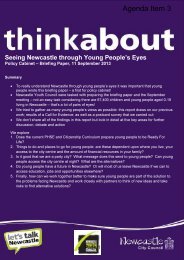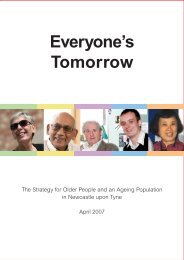NEWCASTLE'S MUSICAL HERITAGE AN INTRODUCTION By ...
NEWCASTLE'S MUSICAL HERITAGE AN INTRODUCTION By ...
NEWCASTLE'S MUSICAL HERITAGE AN INTRODUCTION By ...
Create successful ePaper yourself
Turn your PDF publications into a flip-book with our unique Google optimized e-Paper software.
Renaissance. His teaching staff were no less impressive and included Dr William<br />
Gillies Whittaker, respected English choral conductor, pedagogue, composer and<br />
founder of the Bach Choir (1915) as well as Carl Fuchs, ‘Cello Professor at the<br />
Royal Manchester College of Music. The organisation was typical of any English<br />
School of Music with choral, orchestral, operatic and chamber music<br />
departments and it prepared students for the examinations of the Associated<br />
Board of the R.A.M and R.C.M., and also for the degrees of A.R.C.M. and<br />
L.R.C.M. One of Bainton’s first steps as Principal, at some financial risk to<br />
himself, was to move his school to larger premises at 72 Jesmond Road on the<br />
corner of Victoria Square. In 1937 it moved nearby to an even larger building but<br />
the occupation was to be short-lived. Neither of these premises exist today, the<br />
former was demolished to make way for the motorway and on the site of the<br />
latter now stands Jesmond Metro Station.<br />
Bainton was to be connected with the Conservatoire for more than 30 years, a<br />
period not without incident. In 1914 whilst he was en-route for Bayreuth he was<br />
interned in a camp in Ruhleben, where he was to remain for the duration of the<br />
war. In his absence his wife ran the Conservatoire and even continued the<br />
chamber concerts. His time in the prison camp turned out to be a period of great<br />
creative and practical musical activity, not only for Bainton, himself, who was<br />
placed in charge of all the music at the camp, but also for a number of other<br />
musicians interned there, including amongst others Carl Fuchs (Principal cellist<br />
of the Halle Orchestra) and Edward Clark, a colleague from Newcastle who had<br />
been studying with Schoenberg in Berlin. Bainton formed his own Madrigal<br />
Group, known as the Magpies, played occasional concertos and supervised the<br />
taking of degree examinations in the camp, which the Germans sent to London to<br />
be assessed! After the war, in poor health, Bainton returned to Newcastle, via<br />
Amsterdam, where he conducted two concerts of English music with either the<br />
Concertgebouw or the Amsterdam-Mengelberg Orchestra (opinions vary) and<br />
resumed normal life as Principal of the Newcastle Conservatoire. In 1930,<br />
however, he began touring extensively, visiting India, Canada and Australia,<br />
where he obviously made an impression on the governing body of the New South<br />
Wales Conservatorium at Sydney and they offered him a directorship, which he<br />
accepted in 1934.<br />
It is said that Bainton left behind an organization which had contributed<br />
considerably to the musical life of Newcastle and district. He had at one time a<br />
panel of outstanding teachers, all prominent names in the history of music in the<br />
North East and some of whom went on to achieve wider recognition such as<br />
W.G.Whittaker, a native of Newcastle, who left the Conservatoire in 1929 to<br />
become the 1 st Gardiner Professor of Music at the University of Glasgow and<br />
Principal of the Royal Academy of Music in Glasgow. Carl Fuchs, whom I have<br />
already mentioned; principal cellist with the Halle Orchestra and Professor of<br />
music in Manchester, who also taught in Huddersfield and after a day in<br />
Newcastle would teach half a day in York on his way home. Some few others by<br />
name were A.M.Wall, (violin), Dr Hutchinson, William Ellis (St Nicholas’<br />
81

















